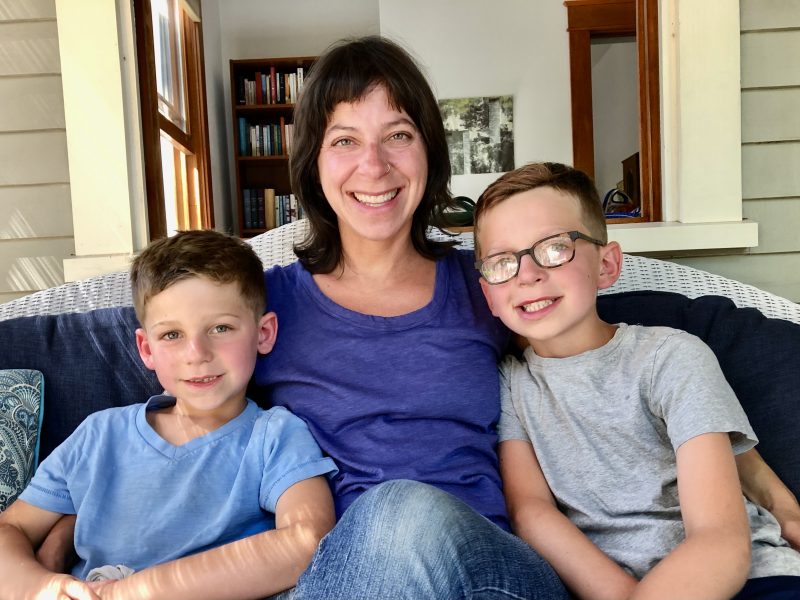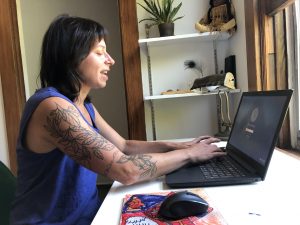David Harris

How You Help: Why Free Jewish Children’s Books Matter
“I remember a lot of brightly colored sort of sweet books about the holidays, that both Henry and Leo were completely in love with,” said Emma Carlson Berne, sitting on her back porch recently. The mother and author was speaking about the special relationship her family has with a set of books incorporating Jewish themes called PJ Library, whose tagline is “Free books for Jewish families and their kids.”
What’s not to love? PJ Library mails Cincinnati families with at least one Jewish parent free, high-quality Jewish books for children ages newborn to 11 years, one a month. PJ Library is managed by the Mayerson JCC in Amberley, which is supported by the Jewish Federation of Cincinnati. The JCC also offers free PJ Library family programs at the J as well at other local venues.
Books are clearly important to this family: shelves of books line the walls, and Berne herself has published numerous children’s books. Berne recently became a PJ Library author herself—she is now a local star, especially at the JCC. Her new book, Shabbat Sabotage (Little Bee), came out this spring, and the J hosted a book release party for her on May 1. “It was so much fun for everyone,” said Marisa Phillips, PJ Library Coordinator. “We celebrated with camp activities, since the book is about a girl solving a mystery at a Jewish overnight camp. We had over 60 parents and kids; it was a great success. And we tie-dyed a lot of shirts!”
PJ Library also pulled Berne more into the Jewish community. Though she attended Congregation Beth Adam as a child, and now attends The Valley Temple in Wyoming, she hadn’t known about the Jewish Federation or PJ Library. A knowledgeable Chicago friend phoned Berne after the birth of her second child and told her about PJ Library. “And then off we went, nothing to it. And we’ve gotten about ten years of books so far.
Berne also credits Phillips at the JCC. “Marisa put us on the list for the various PJ activities. She is our connection to all of that—all roads lead back to her. [These connections] brought me from a place of being totally unaware that it even existed, both personally and professionally. It has sort of brought me under this umbrella.”
Shabbat Sabotage is by no means Berne’s first Jewish-themed children’s book however, though it is her most recent. Other Jewish-oriented titles include The Story of Anne Frank (Rockridge Press, 2021), Escaping the Nazis on the Kindertransport (Capstone, 2017), and Ruth and the Night of Broken Glass: A World War II Survival Story (Stone Arch Books, 2019).
Asked what their rituals around reading are, Berne said, “We started reading chapter books pretty early on before bed. So the PJ Library books would be books which they would read on their own. I’d usually leave [the new arrival] laying around, trying to spark a little interest. That is usually my technique with new books. We really read a lot of PJ books.”
When asked the greatest benefit of PJ Library coming to their home, Berne said, “Friendliness. It felt like some very beneficent organization out there that was reaching out a friendly hand; something that found us as this young Jewish family and was going to invite us in.”
For Berne PJ Library also quickly became closely connected to her professional life. It was Marissa Phillips who told her about PJ Library’s Author Israel Adventure, a free trip to Israel for children’s book authors, which she took right before the pandemic. “Marisa was like my fairy godmother,” said Berne.

At the time, Berne hoped a published book for PJ Library would come out of the trip, and now it has. Though it’s not about Israel—it’s very local in fact: about an unnamed Jewish camp, based loosely on Camp Livingston in Bennington, Indiana. In addition to extensive research, Berne talked to Camp Livingston staff, and asked questions of her eldest son and his friend, who’d gone there. “I wanted to get that sort of joyful spirit,” said Berne.
Berne’s writerly side is analytical and thoughtful. “It was a great pleasure to write about camp because it really is a kind of a world that’s ruled by kids,” she said. “And I remembered from my own camp experiences that camp can be very intense places feeling-wise.”
Berne seemed nostalgic, remembering reading when her kids were little. “There’s that age where they want to read the books over and over and over and over again. I have this odd sense of affection towards those books that I read with my very tiny children. With Apples and Honey, we first started reading it on a trip to Michigan with some friends—and of course by the end everyone memorized it. It kind of became the theme of the trip.”
At this point, Berne’s two youngest sons came home from summer camp, and the interview was over. The busyness of summer with three boys descended; their grandmother was already in the driveway to ferry them to the next activity. Surely though, reading would be in the mix.
Thanks for caring about our community and what we do.
Stay connected: sign up for our newsletter here.

